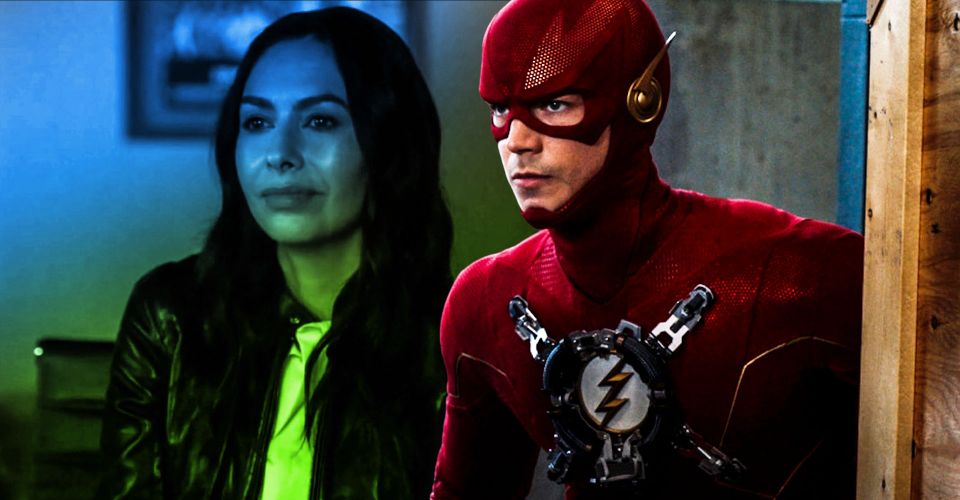The Flash Finally Acknowledged The Arrowverse’s Dumbest Vigilante Plot Hole

Warning: SPOILERS for The Flash season 8, episode 7, “Lockdown.”
The Flash season 8 episode “Lockdown” attempted to address an apparent plot hole regarding vigilante justice in the Arrowverse and revealed that Barry Allen has been repeating the same stupid mistake for years in how he handles criminals. However, the episode’s core concept was complete nonsense within the context of earlier episodes of The Flash. It also made no sense compared to other Arrowverse series, which have also addressed the question of what legal authority superheroes have and what is required of them when they subdue a criminal.
The opening scene of The Flash season 8, episode 7, “Lockdown,” found the Fastest Man Alive bringing a carjacker, a mugger, and a robber to justice within the span of a minute, leaving them handcuffed in the lobby of the Central City Police Department. This did not please CCPD Captain Kristen Kramer, who later complained to Barry Allen about The Flash creating a lot of problems for the police. Specifically, by bringing lawbreakers in and running off without any explanation as to what crimes they had committed, The Flash made it harder for the police to convict those criminals as there was often no direct evidence of any criminal activity.
Kramer’s complaint raised the question of how the criminal justice system works in the Arrowverse in regard to costumed vigilantes arresting people. Unfortunately, this point has already been explored in other Arrowverse series in far greater detail and with far more satisfying answers. The way in which The Flash season 8 addressed the issue only served to make the cast look foolish. This was doubly true of Barry Allen, who logically should be intimately familiar with the importance of evidence and police procedure as a crime scene investigator.
How Superhero Arrests Work In The DC Comics Universe

For context, it is important to note that multiple DC comics books have addressed the legalities of superheroes, both directly and indirectly. In general, most superheroes are presumed to operate under the same Good Samaritan laws that govern real-world citizens’ arrests in the absence of a recognized officer of the law. Beyond that, some superheroes who work with law enforcement agencies are granted official status as a special agent or deputy with limited legal authority. Batman’s partnership with Jim Gordon and the Gotham City Police Department is the most famous example of this, but Superman was also officially deputized by the Mayor of Metropolis, and Green Arrow was granted a special badge by the United States Marshals Service. One issue of The Flash notably revealed that superheroes in the United States also enjoy the right to testify in criminal trials without revealing their secret identities, thanks to a fictional Constitutional amendment that overrides the real world Sixth Amendment, vis a vis knowing one’s accusers if brought to trial.
Why Lockdown’s Premise Makes Barry Allen Look Like An Idiot

The Flash season 8, episode 7 “Lockdown” completely ignores the common sense conceit that the Barry Allen of the Arrowverse might operate under the same principles as his comic book counterpart. Instead, the episode suggests that Barry Allen has spent the last eight years operating in total ignorance of the laws regarding how criminals are brought to trial, simply leaving accused lawbreakers tied up for the police to find later, without a statement as to what their crimes were or any attempt to read the criminals their rights. This idea is completely incompatible with the series’ portrait of Barry Allen as a perpetual stickler, who is methodical in his work as a CSI. It is simply impossible, given his day job, to believe that Barry would not be intimately familiar with the process for bringing a captured criminal to trial.
This point becomes even more ridiculous later in the episode, after Barry takes his concerns that he’s been creating extra work for the police to his adoptive father, Joe West, and Joe’s girlfriend, Cecile Horton. Until his retirement during The Flash season 7, Joe West was the head of the Central City Police Department taskforce overseeing metahuman crimes. Likewise, Cecile Horton was Central City’s district attorney for several years, before she resigned to become a defense attorney specializing in metahuman law. It is simply silly to believe that Joe and Cecile would not have approached Barry before now if his negligence were routinely causing career criminals to escape justice.
Why Central City Should Already Have A Process For Superhero Arrests

The idea that the Central City Police Department wouldn’t have a standard policy for handling those lawbreakers apprehended by their local superheroes is almost as asinine as the idea that Barry Allen would be ignorant of the realities of how criminals are brought to trial. The 2013 STAR Labs particle accelerator explosion gave Central City and its population of 14 million people one of the largest concentrations of metahumans on Earth-Prime. They also have a proportionally higher population of metahuman criminals.
Thankfully, Central City also boasts the world’s largest collective of organized superheroes. Apart from The Flash, superheroes like Vibe, Frost, Elongated Man, Firestorm, Vixen, Steel, and Kid Flash have made their homes in Central City and been shown working with the CCPD to protect the city. Given that, even if one allows for the idea that Barry Allen wasn’t filling out forms at super-speed as The Flash over the last eight years, it beggars belief that the CCPD wouldn’t have some kind of streamlined process for easily allowing their hometown heroes to hand criminals over to the police and make an official report regarding their crimes.
How Other Arrowverse Series Handled Superhero Arrests

What makes the story of The Flash‘s “Lockdown” episode all the more insipid is how the problem it tries to address has already been explored by all the other Arrowverse series and superheroes and handled far better. The storyline of Arrow season 7 is probably the most notable example of this, with Oliver Queen being officially deputized by the police department as a work-around to the anti-vigilante laws passed by a superhero-hating mayor. Black Lightning also addressed this issue, with Jefferson Pierce intentionally limiting his superheroism to those situations the police could not handle safely and being circumspect about informing his contacts within the Freeland Police Department as to what he was doing.
While Supergirl and Superman and Lois have not gone into the same explicit detail as to what authority Supergirl and Superman have legally, both shows made it clear that they were afforded some status as duly appointed agents of the Department of Extranormal Operations (DEO) and Department of Defense, respectively. Even the Legends of Tomorrow, despite a well-deserved reputation for being loose cannons, were shown to be capable of working within the guidelines created by the far more officious Time Bureau in the name of protecting the timeline. This record of organization elsewhere in the Arrowverse only serves to make The Flash and the CCPD look inconsiderate and incompetent, given that they could not reach a similar accord after eight years.
The Flash releases new episodes Tuesdays on the CW.
About The Author


















